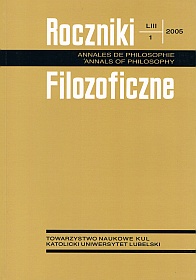Subjective cognitive structures in Gonseth's epistemology
Abstract
The article consists of three parts: a) the explanation of fundamental concepts, b) the inalienables of the epistemic subject, c) the opening of cognitive structures.
This article presents F. Gonseth's concept of the epistemic subject. I consider the subjective determinants of knowledge: the essences, the intuitions and the inalienable. For Gonseth essences are elements of consciousness. Consciousness is equipped with a register of essences of various types: sensory, rational, emotional essences, etc. Essences are for him innate data of our mental equipment. We can say that Gonsethian essences are inalienable. The human mind is able to overcome them, to acquire insights, which are foreign to our primitive natural state.
Gonseth opposes his open phenomenology to Husserlian phenomenology. (According to Gonseth, phenomenology is the study of what he called "essences.").
Copyright (c) 2005 Roczniki Filozoficzne

This work is licensed under a Creative Commons Attribution-NonCommercial-NoDerivatives 4.0 International License.





